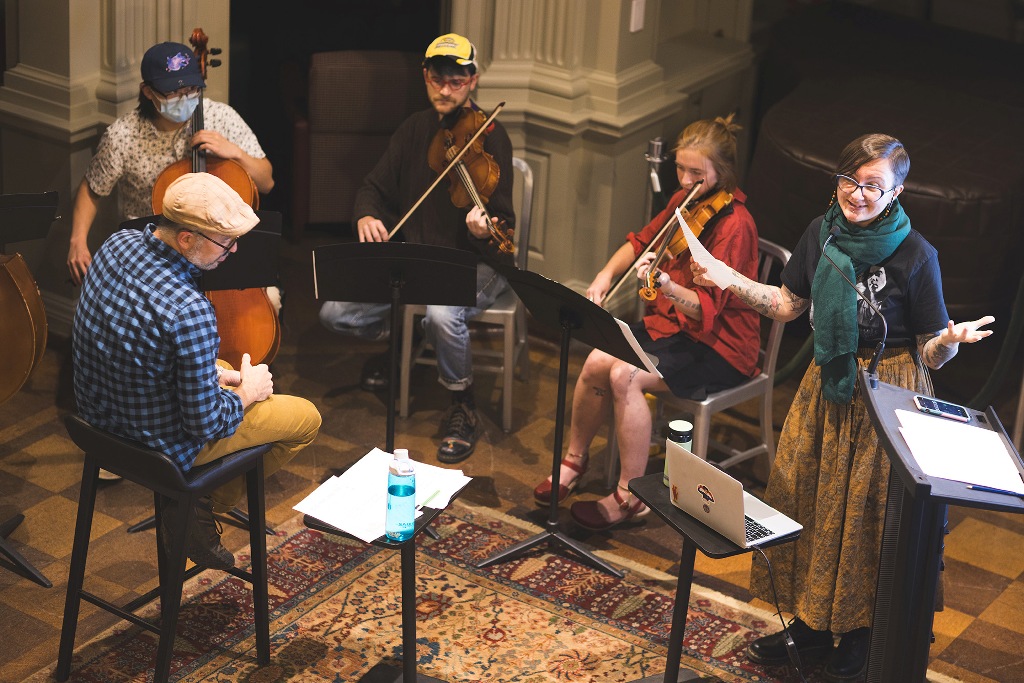Artist website
 Iryna Shuvalova is a poet, translator, and scholar from Ukraine, currently based in Oslo, Norway. She holds an MA in Comparative Literature from Dartmouth College in the US (2014) where she was a Fulbright scholar, and a PhD in Slavonic Studies from the University of Cambridge (2020) where she was a Gates Cambridge scholar and where she also taught Ukrainian language. Originally from Kyiv, Ukraine, she has lived in Greece, the UK, the US, and China before relocating to Norway in 2023. In her current role as a Postdoctoral Research Fellow at the University of Oslo, she researches and teaches society, politics, and culture in Eastern Europe, as well as speaking on these issues internationally.
Iryna Shuvalova is a poet, translator, and scholar from Ukraine, currently based in Oslo, Norway. She holds an MA in Comparative Literature from Dartmouth College in the US (2014) where she was a Fulbright scholar, and a PhD in Slavonic Studies from the University of Cambridge (2020) where she was a Gates Cambridge scholar and where she also taught Ukrainian language. Originally from Kyiv, Ukraine, she has lived in Greece, the UK, the US, and China before relocating to Norway in 2023. In her current role as a Postdoctoral Research Fellow at the University of Oslo, she researches and teaches society, politics, and culture in Eastern Europe, as well as speaking on these issues internationally.
As of early 2024, Shuvalova authored six books of poetry, including the Ukrainian-language collections Ran (2011), Os (2014), Az (2014), and stoneorchardwoods (2020), as well as bilingual volumes Pray to the Empty Wells (in English and Ukrainian, 2019) and The Unspeakable (Niewyrażalne) (in Polish and Ukrainian, 2023). Her most recent Ukrainian-language collection stoneorchardwoods (каміньсадліс) (Lviv: Old Lion’s Publishing House, 2020) has been recognized as the poetry book of the year by Ukraine’s prominent Litakcent Prize for Literature and received the Special Prize of the Lviv UNESCO City of Literature Book Award. Her new book of poems in Ukrainian titled endsongs (кінечні пісні) is scheduled to appear in print in the spring of 2024 with VSL in Lviv. She is also working on a new volume of poems to be published in Norway in 2025 as a bilingual Ukrainian-Norwegian edition, under a provisional title With No Intention of Staying (Har ikketenkt å bli). Her stay at CEAC is generously supported by the grant of Norway’s LeserSøker Bok foundation. Shuvalova’s writing has been widely anthologized and featured in periodicals in Ukraine and abroad, including Literary Hub, Modern Poetry in Translation, Words Without Borders, and many others. Her poems have been translated into twenty-nine languages, including Mandarin Chinese.
As a translator, she is known for rendering Yann Martel’s Life of Pi into Ukrainian in 2016. However, she prefers working with poetry. She has translated into Ukrainian poems of Ted Hughes, Louise Glück, and Alice Oswald. In 2023, she co-translated into English, with Vitaly Chernetsky,Ukrainian poet Ostap Slyvynsky’s collection Winter King (Lost Horse Press, 2023). She has also translated into English Ukrainian modernist classics of poetry, including MykolaBazhan, PavloFylypovych, IuriiKlen, and MykolaZerov. Shuvalova’s translations appeared in Ambit, Modern Poetry in Translation, Poem, and Words Without Borders, as well as in multiple anthologies.
Shuvalova has been awarded numerous prizes for poetry and translation, including the 2010 first prize for poetry in the Smoloskyp Literary Competition – Ukraine’s most important contest for young writers, and second place in the Stephen Spender / Joseph Brodsky Prize (2012). She has supported English PEN as an expert on Ukrainian translation projects and has been a member of PEN Ukraine since 2020. She has performed her poetry internationally, at multiple readings and festivals, including the Oslo International Poetry Festival, Stockholm International Poetry Festival, and others. Shuvalova has also taken part in multiple writing residences and fellowships in China, Greece, Latvia, the UK, and more, including the Hawthornden Castle Fellowship in 2015.
She lived and worked in China for three years between 2019 and 2023: in Hangzhou, then in Nanjing. Her work has been translated into Mandarin Chinese by Sun Dong (孙冬) and was published in Jintian(今天) in 2022. She has a strong interest in Chinese culture, particularly literature, philosophy, and film. At CEAC, she will be working on her new poetry collection, focusing specifically on experiences of itinerant living and displacement. In her project “Learn to Lose”, she will explore the experience of loss as an essential component of our co-existence with people, places, and even with ourselves.When moving ahead, to something new, we are often encouraged to focus on what lies ahead instead of what is left behind, says the poet. However, what is left behind is the things that shaped us and the things we shaped, all of them jointly constituting an essential part of who the we of today – the moving-ahead-we – are.
Re/placement, dis/placement, and seeking one’s new place in the landscape and the world is at the core of the poet’s work. Her project has both a social dimension and an environmental one. On the one hand, she examines the experience of conflict that disfigures lives and landscapes alike; on the other hand, she seeks to understand the sense of being-in-the-place and of no-longer-being-in-the-place as equally valuable human experiences. As someone interested in Taoist thought and beliefs, she sees one of the key threads of this book as exploring the concept of 无为 – being carried by the flow of life and moving with it rather than constructing an elaborate scheme of interventions attempting to chart one’s course. Because many of her poems have been inspired and shaped by her experience in China, she is particularly excited about potential collaborations with Chinese visual artists – something that she hopes one day will result in a book of its own.











